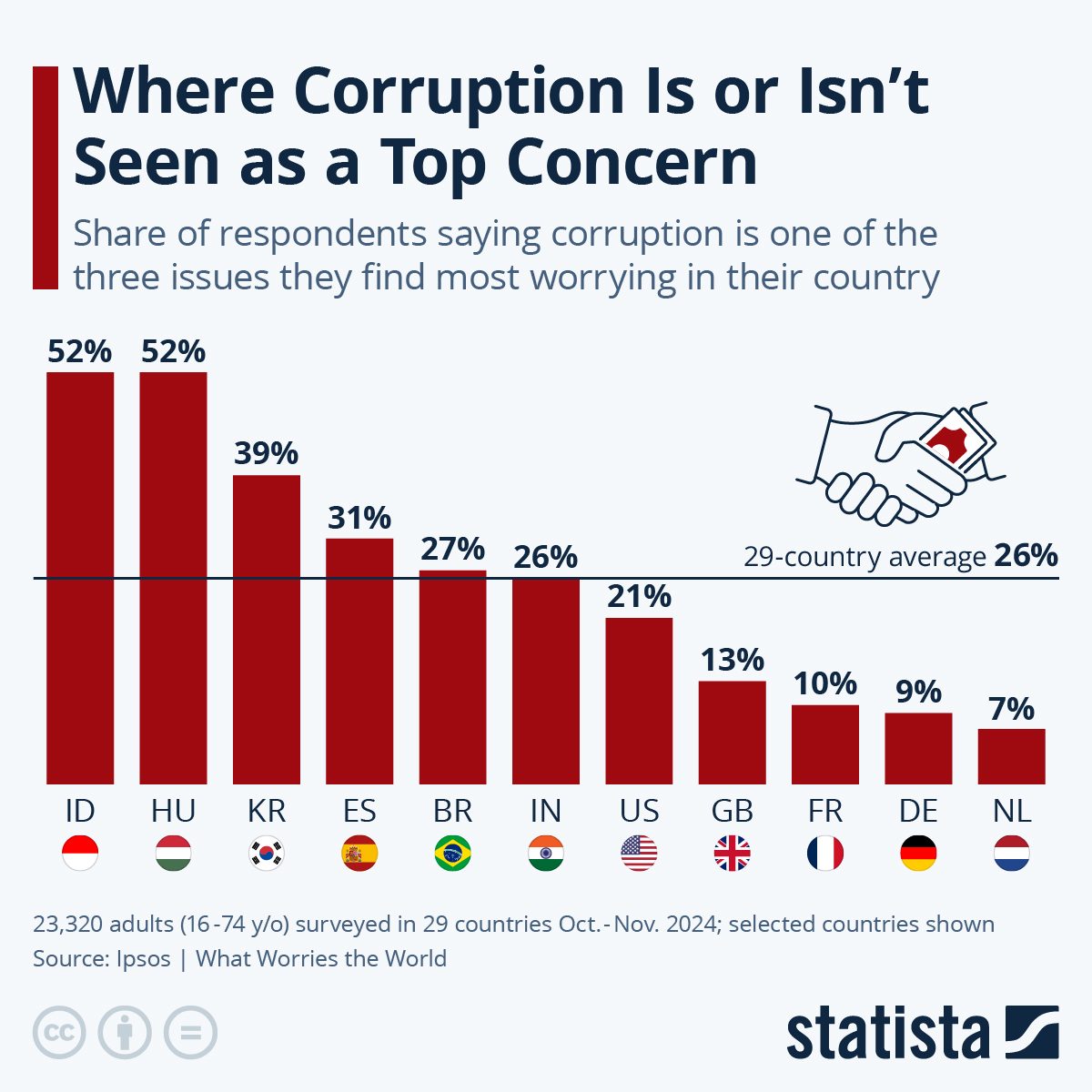
International Anti-Corruption Day is observed annually on December 9 to raise awareness about the harmful effects of corruption and to promote efforts to combat it.
Introduced by the United Nations in 2003 following the adoption of the United Nations Convention against Corruption, the day emphasizes the global nature of the problem, which erodes public trust, exacerbates inequality and undermines development.
While corruptions is in fact a global issue, Statista's Felix Richter shows in the chart below the degree to which people perceive it to be a problem varies greatly across countries. According to Ipsos’ What Worries the World survey, 26 percent of respondents from 29 countries named financial and political corruption as one of the three most pressing issues in their country in November 2024, trailing only crime/violence, inflation, poverty/inequality and unemployment as one of the top five concerns on people’s minds.
You will find more infographics at Statista
Indonesia and Hungary topped the ranking, with 52 percent of respondents naming corruption as a top 3 worry ahead of Peru (47 percent and South Africa (46 percent).
This year’s campaign for International Anti-Corruption Day serves as a call to action to build a culture of integrity for younger generations.
“While young people are significantly affected by corruption, they also have the potential to become powerful agents of change in the fight for a future rooted in integrity,” the campaign website says.
“Young people must demand accountability and actively participate in anti-corruption efforts.”
At the other end of the scale, respondents from the Netherlands, Germany and France were most likely not to see corruption as a top 3 issue in their country at 7, 9 and 10 percent of respondents, respectively.
International Anti-Corruption Day is observed annually on December 9 to raise awareness about the harmful effects of corruption and to promote efforts to combat it.
Introduced by the United Nations in 2003 following the adoption of the United Nations Convention against Corruption, the day emphasizes the global nature of the problem, which erodes public trust, exacerbates inequality and undermines development.
While corruptions is in fact a global issue, Statista’s Felix Richter shows in the chart below the degree to which people perceive it to be a problem varies greatly across countries. According to Ipsos’ What Worries the World survey, 26 percent of respondents from 29 countries named financial and political corruption as one of the three most pressing issues in their country in November 2024, trailing only crime/violence, inflation, poverty/inequality and unemployment as one of the top five concerns on people’s minds.
You will find more infographics at Statista
Indonesia and Hungary topped the ranking, with 52 percent of respondents naming corruption as a top 3 worry ahead of Peru (47 percent and South Africa (46 percent).
This year’s campaign for International Anti-Corruption Day serves as a call to action to build a culture of integrity for younger generations.
“While young people are significantly affected by corruption, they also have the potential to become powerful agents of change in the fight for a future rooted in integrity,” the campaign website says.
“Young people must demand accountability and actively participate in anti-corruption efforts.”
At the other end of the scale, respondents from the Netherlands, Germany and France were most likely not to see corruption as a top 3 issue in their country at 7, 9 and 10 percent of respondents, respectively.
Loading…





